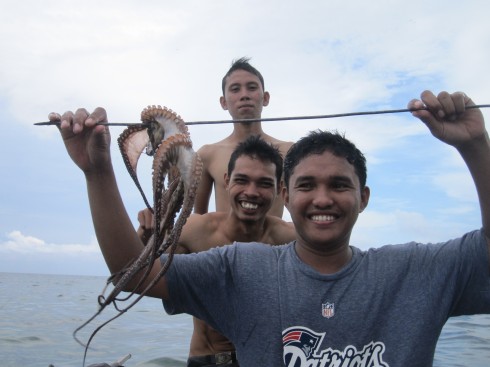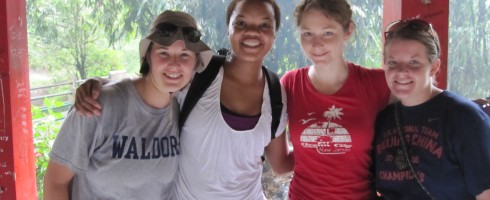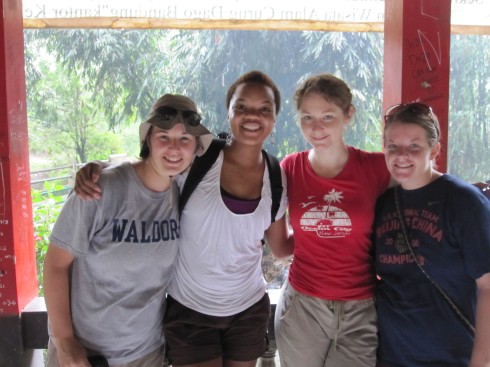The above picture is of the Shansi fellows with our TESL certificates on the last day of class and is provided courtesy of Veronica Colegrove.
Wow, I have really let this blog go! No longer – here is an update of my homecoming and where I see my blog, myself and my writing, going.
LEXINGTON/SOMERVILLE, MA
Minus the lack of snow, I had a great Christmas with my family. I had so many presents for them from Indonesia and Israel, including Ahava skincare products for my sister, my mom and even my dad. I definitely spoiled my family this holiday season! I was then lucky enough to have a visit from the loveliest duo there is, Aisha and Jasmine, and got to mostly eat amazing food and ring in the New Year with my loves.
Unfortunately for me, and probably for those around me, I was undergoing some serious culture shock. First of all, I was SO COLD. I felt like I had the flu because every part of my body ached as part of some reaction to the temperature. While my friends were wearing your average winter jackets and sometimes gloves, I was still shivering INSIDE in my outdoor heavy-duty jacket and gloves and sometimes even a hat. I felt ridiculous. I wanted to go ice skating, but even on a day where it got up to 40F, I couldn’t bring myself to spend more than 10 minutes outside. I was also really missing Indonesia and Israel, and all the people that I know that are a part of those amazing countries. I felt like being around all the people I loved best was made very strange by the fact that I had been away for so long. Relating to people was really hard, and I felt like I was walking around with some sort of cloud around my head, making it possible only to partly communicate with people around me in a way that was mutually meaningful.
OBERLIN:
Still under this culture shock haze, I made my way to Oberlin. Initially, I was not super excited to go. I was pumped about the Shansi Fellowship, but I was apprehensive about spending my winter covered in snow with people who I pre-supposed would be younger than me in both age and maturity. Upon meeting my exceedingly talented and amazing co-fellows, all of those conjectures melted away to be replaced by a warm fuzzy blanket of love. I’m sorry that’s corny, but that’s how I feel. These incredibly mature students who see such value in spending time overseas and who also love studying languages and nerding out about other cultures were the cure for my own culture shock. It took me no time at all to compartmentalize my feelings for Indonesia and immerse myself in the opportunities that lay ahead. I was with these fellows almost 24/7 – I was also fortunate enough to have two 2009 grads living in the same house as me, which mainly amounted to late-night Mad Men watching and happy-hour frolicking. We all took a class together on TESL (Teaching English as a Second Language) and had 5 wonderful ESL students originally from China and Korea to teach and bounce ideas off of. We stayed up late lesson planning together and coming up with cool themes to frame our teaching around. We bonded over tons of homework and a love of Asian food. We ate an entire box of tofu that was leftover from a co-op (we’re talking 40 sizable slabs, of which we ate around 30). We hosted a potluck for the ESL students and other teachers at Shansi House, and had an amazing retreat weekend with some former Fellows. We were inundated with information about the many awful viruses, bacteria and parasites we assuredly would encounter. We all came out forever fused at the hip. I have my Shansi Fellows and the former Shansi Fellows) to thank for getting me over my culture shock, and putting the amazing future into perspective. I’ve already been back to Oberlin once to visit them, and plan on going two more times, including over Commencement Weekend! We all have to do a skit for this mini-ceremony in our honor, which I am pumped for. An article on the Shansi website and an article on the Oberlin OnCampus website highlight our awesome stories 🙂
BACK TO LEXINGTON:
I think I’ve done a really good job of embracing the fact that I am living with my parents at 25 and have no real money of my own. I’ve been dog walking, last-minute baby sitting, standing in as a model for a wedding photography company (I got to be a fake bride for two days AND wear a really nice wedding dress), and later this month I’ll be burning CDs for attendees of a UMass Medical School conference relating to mindfulness in medicine. I’m also reading a lot about India (currently getting into “Makers of Modern India”, edited by Ramachandra Guha – I also have a huge stack of books on South East Asian feminism to get through), watching Bollywood movies, trying to learn Hindi (I tried to sign up for a class at the Boston Language Institute, but only one other person signed up so they had to cancel the class – I’m doing some studying with programs from the library, plus looking into tutoring though!), and running every day (I’m up to 25 minutes, and “WOW CHRISTINA THAT IS SO AMAZING!!!” is what I need to hear from you right now…) I’ve also been catching up with old friends I haven’t seen in years, going to lots of trivia nights, reading almost every article in the Economist, and getting into shows such as Downton Abbey, Parks and Recreation, and Big Love. I’ll also be trying to see family more, including my dad’s parents, who moved to Annapolis from their awesome house in Rhode Island this January. Another big project I’m working on is uploading all of my remaining Indonesia and Israel photos to the internet…it will take a while!
I also figured out a lot of what I’ll be doing in India, which is very exciting! I’ll be working for the Aware Women’s Action for Justice team (AWAJ) at Jagori Grameen (for an outline of the fellowship, see this post). Below is a rough outline:
- strengthening the Jagori team on issues related to female empowerment
- teaching rural youth English language skills
- organizing activities and workshops for adolescent girls on issues of self growth and confidence building
- developing creative counseling programming to strengthen the emotional and mental well-being of the AWAJ collective members
- documenting and preparing reports of various events organized by the AWAJ team
- designing and conducting short research projects related to women’s issues
- training young Jagori team members to utilize street theater as an educational tool for social change
- standardizing the body literacy school program (I’m still a little unclear about the exact meaning here, but I’m assuming it means strengthening literacy in the students who attend school?)
- participating in all activities of the organization
This was written in a letter to me crafted by Ahba and Anoop, two of my supervisors at Jagori Rural, and by the Associate Director of Shansi. I’m really happy with it, and am glad English teaching is only a part of what I’m doing, despite how much I like it.
I’m also attempting to put into words my experiences in Indonesia (inspired by a friend). We’ll see what comes of them – if nothing else, it will be therapeutic for me, and possibly entertaining for others.
For now, I’ll be writing intermittently about Shansi-related or travel-related stuff, getting ready to leave, etc., but the real fun on this blog won’t start again until mid-June, when I go to Wisconsin to study Hindi at the South Asian Summer Language Institute (SASLI). I think I’ll keep my blog at this website, but somehow change the name – we’ll see!
Until I have more news, sit tight!






































